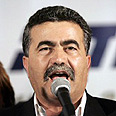
Peretz - Israel's next defense minister?
צילום: איי אף פי
The case for civilian defense minister
Peretz's nomination good chance to redefine nature of defense portfolio
In countries that aren't Israel there is no need to explain why a defense minister should have superior civilian qualities. In the United States, senior military officers can serve in senior government posts, but may not serve as Secretary of Defense for at least five years after retiring from military service.
Here, Shaul Mofaz became defense minister five months after retiring as IDF chief of staff, and most Israelis saw no problem with this.
The main reason for this is that in other countries, the minister of defense is the head of a civilian body that commands, channels and molds the armed forces. In Israel, the defense minister is an unclear go-between between the prime minister and chief of staff. His role is somewhere between the army's supreme company commander and a civilian leader meant to calm the worried populace.
For this role, there is no better person than someone we're accustomed to seeing in that role.
But a minister who has no civilian insights has no chance of making this post what it should be: To set policy in line with an overall security approach and to force the army to do not what is inherent to it, but rather, to do what the public needs.
Civilian minister
Moshe Arens, the best defense minister Israel has had in the past quarter-century – and the only one who never donned a uniform – forced structural changes on the army and questioned the basic approaches of senior army officials with regard to the fighting in Lebanon. The IDF men who came before and after him (except for Yitzhak Rabin) usually checked out aerial photographs to approve the path of approach to the target.
That's fine, but you don't really need a defense minister for that.
If we take an example from overseas, we see that Donald Rumsfeld was among those who led the United States into its failed war in Iraq, but he also forced upon the U.S. army an impressive list of structural and conceptual changes, over the heated objection of many of his generals. And America does not have the budgetary problems we've got here.
Wise move
If all this is true, the nomination of a civilian figure such as Amir Peretz to the defense ministry is a step in the right direction. We must provide him with a strong decision-making apparatus – a strong National Security Council that would weigh each cog in the wheel – and especially intelligence – and that would present the government with real options, so that the army's worldview and operational proposals are not the only issue on the table.
Such a council should be required to do real work to determine the country's security budget, to reconsider basic security principles, the real threats facing Israel and the answers to those threats, and should redefine the relationship between civilian society and the IDF, including mandatory military service and non-military national service options.
There is one question remaining: Amir Peretz himself. His conduct since the elections raises questions about his discretion, his composure and his ability to correctly read a situation. Shoulder stripes are not necessarily a guarantee – one need only look at the political behavior of such decorated generals as Shaul Mofaz and Ehud Barak – but Peretz should take it easy, go back to thinking clearly, and only then should he fearlessly accept the defense portfolio.










